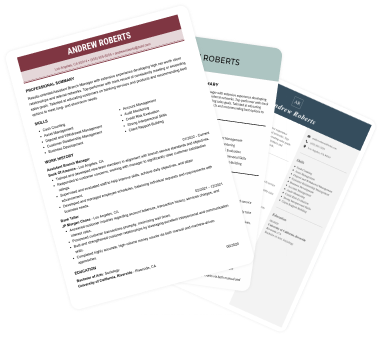Create a professional CV now!
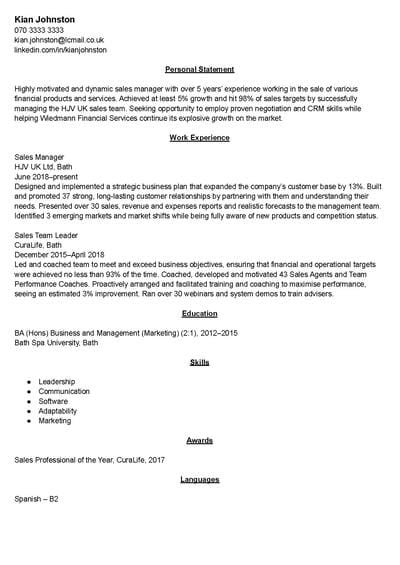 NO
NO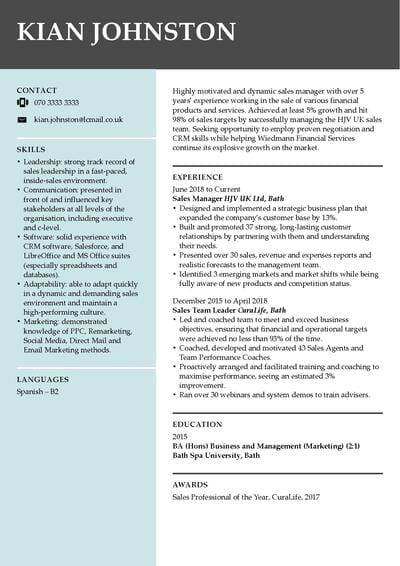 YES
YESLast updated on 29 December, 2025
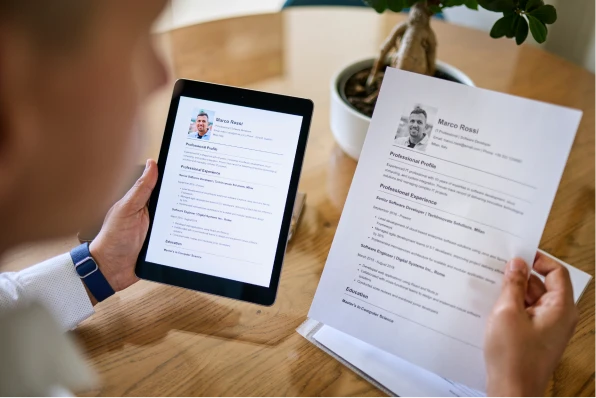
You’ve dedicated a lot of time and effort to your university degree and want to do it justice on your CV. There’s plenty of conflicting advice out there regarding how to list a degree on a CV, from how to abbreviate degree types to how to present an honours class.
This article offers proven methods for how to list your degree on a CV. With expert examples of how to write degree classifications on a CV, you’ll be confident that your education section includes everything it needs and is organised in a way that actually captures attention.
Create an effective CV in minutes. Choose a professional CV template and fill in every section of your CV in a flash using ready-made content and expert tips.
Create a professional CV now!
 NO
NO YES
YESWe created the sample on the left using our builder. See other good CV examples like this one.
Want to research other useful guides on CV writing? See these articles:
Including degrees in CVs is more than just a formality. It’s about showcasing your education in a way that strengthens your application and makes you stand out. To do this well, you need to balance clear formatting, relevant detail, and smart placement within the bigger picture of your CV.
Below are some practical tips to help you present your academic background and degree information on a CV most effectively:
Pay attention to the correct CV format and follow a proven CV-writing guide. Regardless of the format you pick, follow a recommended CV layout and leave your CV personal details near the top, where they’ll be easier to find. Use subheadings and white space to break your CV down into subsections. Always limit your CV to one page.
Choose an easy-to-read CV font (like Arial, Calibri, Garamond) and stick with it. Keep its size at 10–12 points for text and 14–16 for headings. Use bold and italics consistently: if you bold your employer names in work experience, also bold your university name in the education section.
Always list the university name and location, followed by the degree type and name. Use abbreviations only for the degree type (e.g., BA, BSc, MA), but write the degree name in full (English Literature rather than Eng. Lit.). Add your years attended or completion date, unless it was more than 15 years ago.
If you graduated with upper-second class honours (2:1) or first-class honours, include it in its abbreviated form (e.g., 2:1, 1st) or in full (First Class Honours). Avoid listing lower second (2:2) or third-class classifications, but you can still include “Hons” after your degree.
List your most recent or relevant degree first. If you hold a master’s or doctorate, these should be listed before undergraduate qualifications. Alternatively, prioritise according to relevance if the job posting specifies a particular degree.
If you are a recent graduate with limited work experience, place your education section near the top of your CV. If you are more experienced, position it below your professional background, so employers see your work achievements first.
The heading should be simple, such as Education. Avoid unnecessary words like “Degrees” or “University Section.” Stick to what recruiters need: university, degree, dates, and relevant distinctions.
Don’t clutter the education section with every award or accomplishment. Create a dedicated section for skills, awards, or scholarships if you have many. This keeps your CV neat and helps recruiters quickly spot your achievements.
Adding a degree to your CV is about more than listing credentials—it’s about presenting your education clearly while ensuring your entire application looks polished and professional.
Here’s a well-written example to guide you:
PhD Media and Cultural Studies
University of Edinburgh, Edinburgh
2016–2020
MPhil Journalism
University of the West of England, Bristol
2014–2016
Depending on your educational background, you can include various degrees and abbreviations in your CV. A typical classification includes two degree categories: undergraduate and postgraduate degrees.
🎓 The undergraduate degrees include:
🎓 The postgraduate degrees are:
When writing a CV, the way you list degrees can significantly influence how your academic background is perceived. Whether you hold a bachelor’s, a master’s, or a doctorate, clarity and consistency are crucial.
Here are some more detailed tips on how to list a degree on a CV, organised by the degree achieved:
Use the template:
[Degree Type] [Degree Name], [Years Attended], [University Name, Location]
Abbreviate only the degree type (e.g., BA, BSc), but write out the full degree name (e.g., Mechanical Engineering). If you are still studying, include your expected graduation date.
Honours deserve clear recognition. Add “Hons” after your degree and, if you earned a 2:1 or a first-class, include your classification. Standard formats include “2:1,” “2.1,” or “First/1st.” You may write honours in full words if you prefer a formal tone. Avoid listing lower-second (2:2) or third-class classifications, but you may still include “Hons.”
For a master’s degree obtained through coursework, follow the same format as a bachelor’s degree:
[Degree Type] [Degree Name], [Years Attended], [University Name, Location]
Only abbreviate the degree type (e.g., MA instead of Master of Arts). No thesis details are required here.
If you completed a research master’s (eg., MPhil), follow the coursework format but include more details. Add your thesis title, supervisor’s name, and any merit-based scholarships. This helps showcase your research skills and academic achievements.
For PhDs, follow the same format as a research master’s. Be sure to include your thesis title, supervisors, and any scholarships. This highlights your expertise and shows the depth of your academic work.
A strong CV summary will convince the recruiter you’re the perfect candidate. Save time and choose a ready-made personal statement written by career experts and adjust it to your needs in the LiveCareer CV builder.
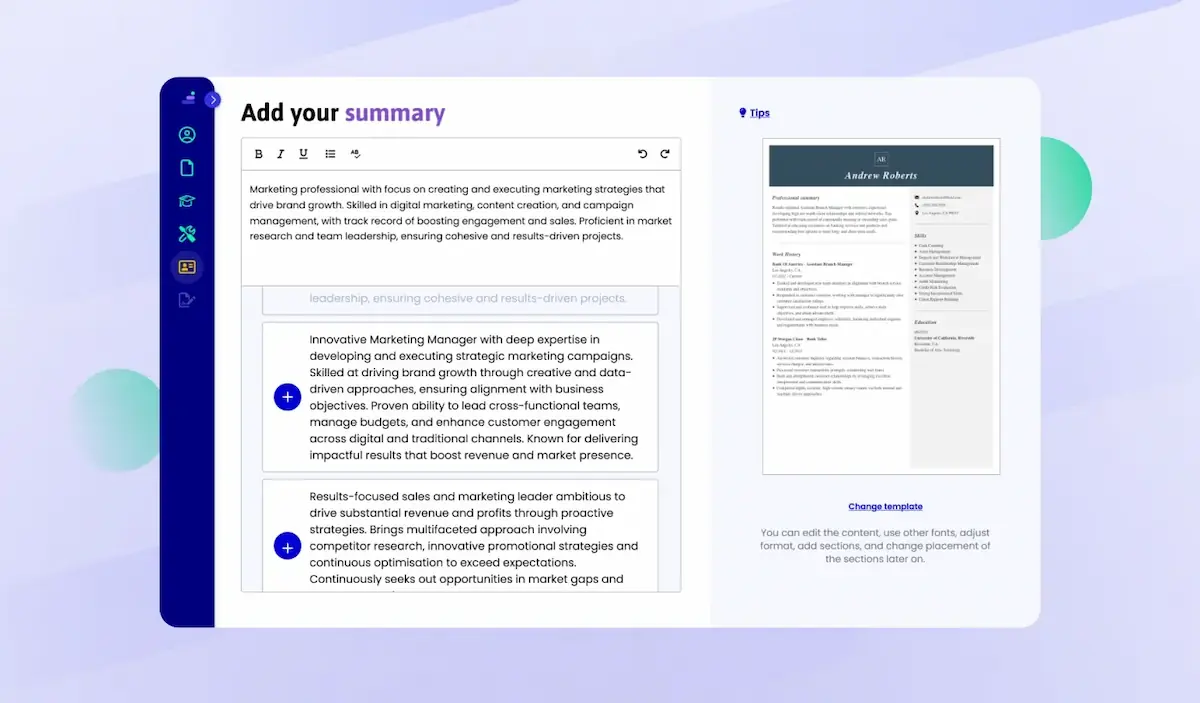
Once you’re a proud holder of an academic degree, you must showcase it in your CV’s crucial sections. Where and how to write a degree on a CV?
To start, you can mention the degree in your personal profile, especially if you are a recent graduate. Place your university and degree names at the beginning of your personal statement before highlighting your personal qualities and skills.
Most importantly, include your degree in the education section of your CV. List your qualifications in reverse-chronological order, starting with your academic title and dates of study. Below, mention the university name and its location.
If you're still finishing your latest degree and writing a student CV, list your expected graduation date rather than the actual date. You can omit your high school education from a CV once you have an undergraduate degree and at least one year of postgraduate study or work experience.
Need additional information on CV writing? Check these guides:
You don’t have to be a CV writing expert. In the LiveCareer CV builder you’ll find ready-made content for every industry and position, which you can then add with a single click.

Our editorial team has reviewed this article for compliance with LiveCareer’s editorial guidelines. It’s to ensure that our expert advice and recommendations are consistent across all our career guides and align with current CV and cover letter writing standards and trends. We’re trusted by over 10 million job seekers, supporting them on their way to finding their dream job. Each article is preceded by research and scrutiny to ensure our content responds to current market trends and demand.
Category: CV Help
Crafting a job-winning CV is all about showcasing your unique skills and experiences. Start with a strong personal statement that highlights your career goals and achievements.
Try Our CV Builder Now